Market will ‘tick over’, say Renault and Volvo, although over-supply in the secondhand market remains a cause for concern as acceptable prices are difficult to achieve. John Lewis reports.
Britain’s truck market has fallen by almost 6% according to recent figures published by the Society of Motor Manufacturers and Traders (SMMT).
Brexit-related economic uncertainty has been singled out as a key cause for the dip.
Some truck makers are weathering what could be a gathering storm better than others, however.
Renault’s sales volumes and market share were holding steady at the time of writing, while Volvo’s had only slipped very slightly.
Recent fleet sales successes for Volvo include an order for 50 FH 6x2 tractor units with Globetrotter XL cabs placed by Halfords.
They are fitted with forward collision warning and automatic emergency braking (AEB) as standard and are additionally equipped with lane-keeping support and nearside proximity sensors.
Essex construction site services specialists Gordon Group, a FORS (Fleet Operator Recognition Scheme) Gold accreditation holder and CLOCS (Con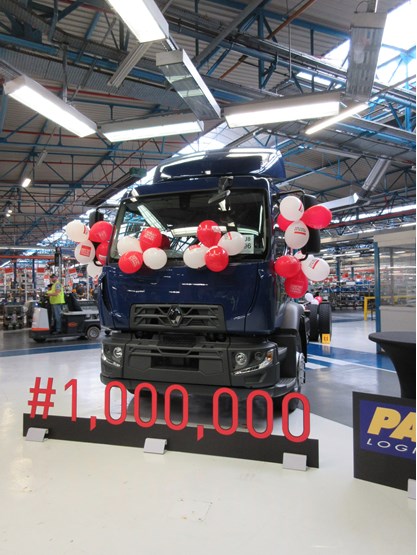 struction Logistics and Community Safety) Champion, has placed an order for 30 FMX 8x4 tippers.
struction Logistics and Community Safety) Champion, has placed an order for 30 FMX 8x4 tippers.
READ MORE: Volvo FH 460: Liquid natural gas is a logical alternative to diesel
Despite those large contracts, Arne Knaben, managing director, Volvo Group Trucks UK and Ireland, who is responsible for both Renault and Volvo, is not complacent.
“For the moment it’s so far, so good and we’re selling well,” he says.
“That said, we’re hearing some expressions of uncertainty. I spoke to one of our big customers recently who told me that in his view Brexit would be very good for the UK in the medium and long term.”
Knaben adds: “I asked him what it would be like in the short term and he replied that he thought it would be a bit bumpy.
“Then I asked him what he classed as the short term. He said ‘five years’. That’s a long time in my business.”
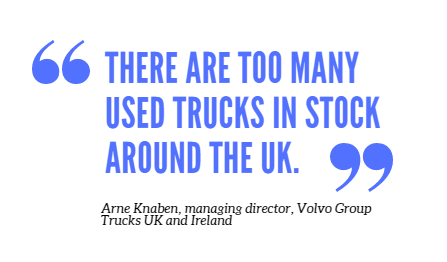
Knaben doubts that 2018 will witness a precipitous fall in registrations should fleets suffer a Brexit-related crisis of confidence.
“I think the market will be stable and not do anything dramatic,” he says. “It will tick over rather than grow or accelerate with customers saying ‘wait and see’.”
This is a view shared by Nigel Butler, UK commercial director at Renault Trucks.
Butler believes demand will soften over the next 12 months but suggests any decline will be gentle rather than a sudden, headline-grabbing collapse.
Of perhaps greater concern is the market for secondhand trucks.
“There are too many used trucks in stock around the UK,” Knaben says. An inability to dispose of used ones easily – and at an acceptable price – affects sales of new vehicles.
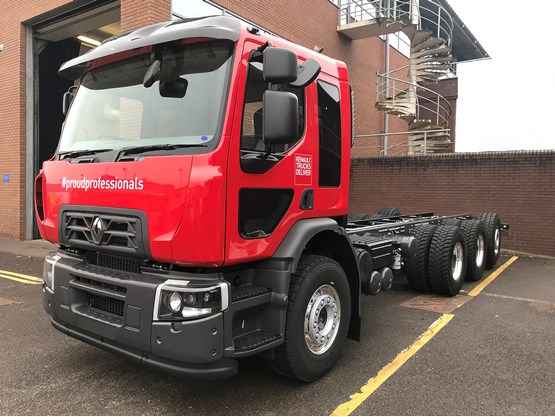
Large quantities of secondhand trucks have been exported from Britain for many years, so overseas sales should, in theory, provide an escape valve, especially given the decline in the value of sterling.
Unfortunately, some of the long-established destinations for used exports cannot readily take the growing number of secondhand Euro 6 models that are becoming available because they are not as yet up to speed with the technology.
“That’s a concern,” says Knaben.
Butler says: “They’ve struggled to cope with Euro 5, too.”
READ MORE: Mitchell's of Mansfield announces £700,000 investment in Renault T Range trucks
Nor are export customers always happy about buying vehicles that have recorded a high mileage over a short space of time because they have been double- or triple-shifted by a UK transport fleet, Knaben says – a not-untypical British practice.
That is despite the fact that modern models that have been serviced regularly can clock up a remarkably-high mileage without causing the operator anxiety.
Used exports are also being affected by unrelenting competition from new Chinese trucks, especially in sub-Saharan Africa, says Butler. “They’re simple and they’re cheap,” he remarks.
Chinese businesses are funding many of the major infrastructure projects in the countries concerned. Not surprisingly, they would prefer it if hauliers working on them used Chinese trucks acquired with Chinese finance.
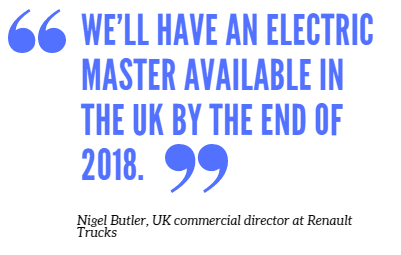
As it happens Knaben is quite pleased with his company’s performance in the secondhand sector.
“We’re happy with our sales levels although the prices aren’t so good,” he comments. “But that’s a natural effect of there being too many used trucks around.”
Turning to London’s Direct Vision Standard (DVS), Knaben says that while he appreciates what Transport for London (TfL) is trying to do – “we’ve worked closely with them”, he adds – it will always be a challenge for a manufacturer to produce trucks that comply with rules that apply in just one city; even a major capital.
Volvo and Renault are, nevertheless, working to meet London’s requirements.
READ MORE: Volvo Trucks: Making life safer for vulnerable road users
Volvo has come up with two FM-based construction trucks intended to meet TfL’s proposed Safety Standard Permit Scheme.
Trucks with a zero-star vision rating will have to comply with its requirements, which could include cameras and sensors, in order to qualify for a permit to operate in London from 2020 onwards.
A few months ago, a low-entry Range D 6x2 26-tonner broke cover, devised in conjunction with Veolia, as part of a £5 million two-year project.
In addition, a prototype low-cab-height Renault Range C tridem 32-tonner has been developed, powered by a 325PS 8.0-litre diesel.
Said to combine the load capacity of an eight-wheeler with the manoeuvrability of a six-wheeler, the Range C320’s rear lift axle delivers a narrow turning circle, says Renault, which also helps keep the truck close to the kerb when the driver turns left. That reduces the gap cyclists might be tempted to try to dart through.
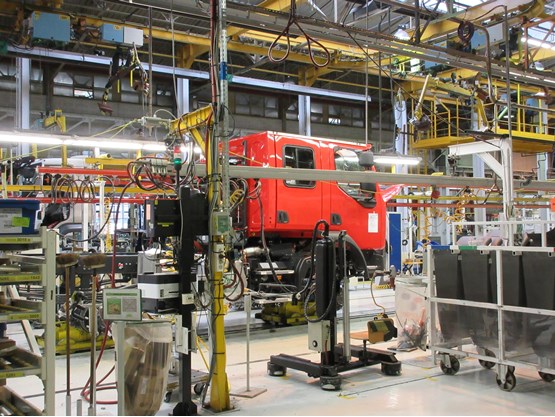
On display at last November’s Freight in the City Expo at London’s Alexandra Palace, the tridem comes with an extra window in the passenger door to make it easier for whoever is behind the wheel to spot vulnerable road users.
The same type of window was fitted to the low-entry Range D skiploader which was also on show, with two-step access to the cab and a 375mm step height. The truck has cycle sensors plus a Roadcrew 4 camera system.
London’s politicians – and their counterparts in other major urban areas in the UK – are, of course, understandably eager to cut particulates and NOx and are increasingly targeting NO2 (nitrogen dioxide) too.
READ MORE: Renault Trucks launches ‘game changing’ fleet management system
Over the past 18 months, Renault Trucks has embarked on a variety of zero-emission trial initiatives including a battery-powered Range D 16-tonner and a 4.5-tonne Maxity Electric equipped with a hydrogen fuel cell.
Renault has also come up with versions of the Range D Wide rigid, including a 26-tonner powered by compressed natural gas (CNG).
“We only bring vehicles to market when we are confident about the technology. We’ll have an electric Master available in the UK by the end of 2018,” says Butler.
Volvo is busy introducing a concept long-haul hybrid truck. Also debuting are gas-powered versions of the FH and FM which it says will be suitable for inter-city work with outputs of 425PS or 465PS.
Their CO2 emissions are said to be 20%-to-100% lower than those of their diesel equivalents dependent on the fuel chosen. They can run on liquefied natural gas (LNG) or bio lng.
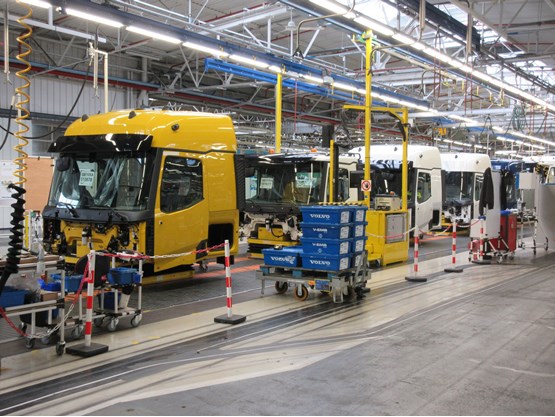
The largest onboard LNG tank that can be fitted holds enough fuel for a 1,000km (620-mile) journey says the manufacturer. Fuel consumption is said to be on a par with that of Volvo’s diesel engines.
With a nod to London’s concerns, a factory-installed lower window in the passenger door is among the features being fitted to the FMs.
The diesel engine is a long way from being finished with Renault in the process of launching the 527PS flat-cab-floor Range T High tractor in France.
There is a trend towards diesel engine downsizing and down-speeding, but downsizing is not appropriate in all circumstances, says Butler.
Commercial Fleet spoke to Knaben and Butler on a visit to the Renault plant at Blainville, northern France.
Opened just over 60 years ago, it recently built its millionth truck – a Range D which was presented to Phil Thurston, joint managing director of UK operator Pace Logistics.
With 2,000 employees, it also builds cabs for Volvo and DAF.



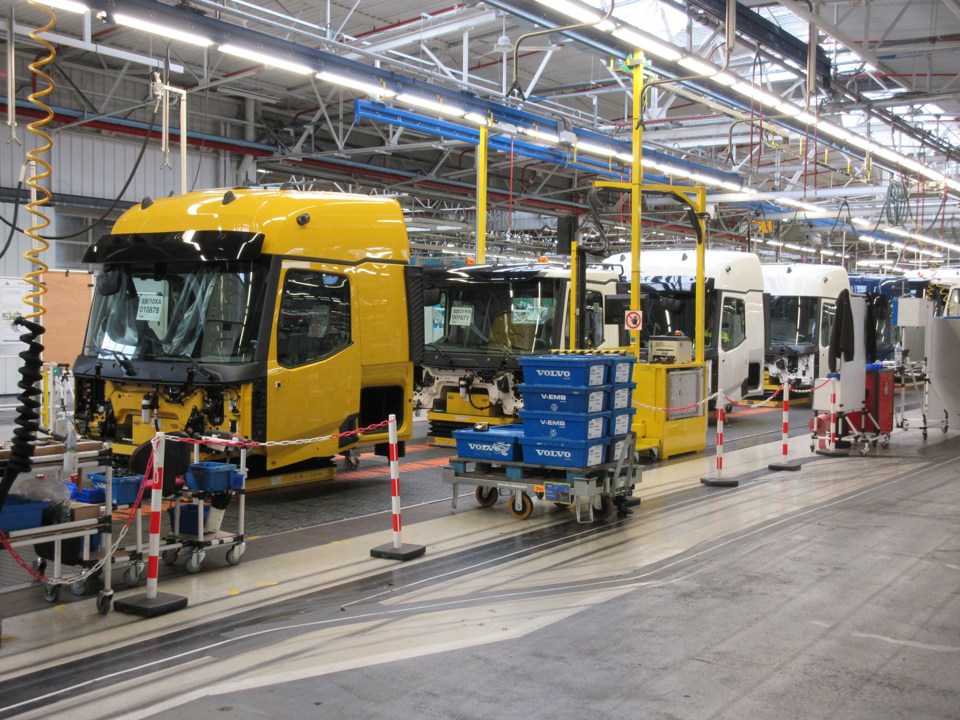













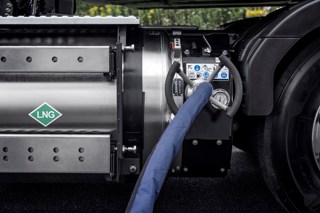
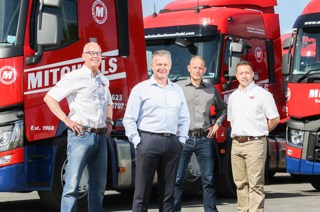
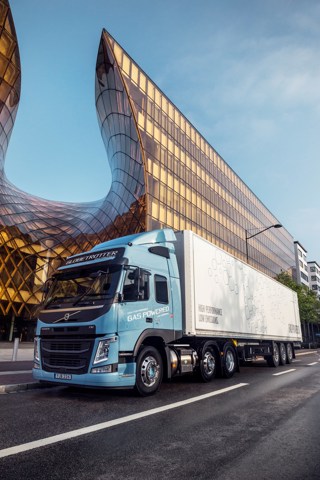
Login to comment
Comments
No comments have been made yet.